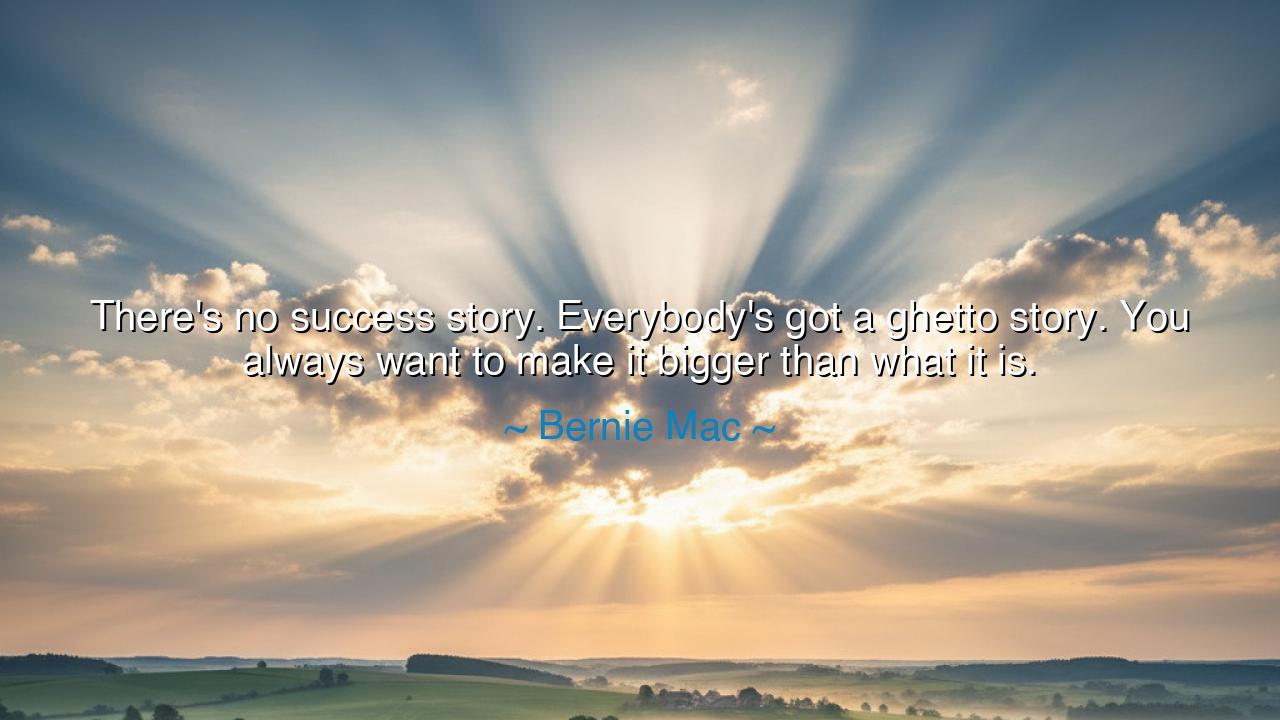
There's no success story. Everybody's got a ghetto story. You
There's no success story. Everybody's got a ghetto story. You always want to make it bigger than what it is.






Hear the raw and unflinching words of Bernie Mac, who declared: “There’s no success story. Everybody’s got a ghetto story. You always want to make it bigger than what it is.” In this confession, he strikes at the heart of human storytelling, tearing away illusions and reminding us that what we often call success is not a tale of ease and glamour, but one born of struggle, hardship, and survival. To speak of a “ghetto story” is to speak of beginnings rooted in scarcity, in difficulty, in being underestimated—and yet, from such places, greatness often emerges.
The ancients, too, knew that the road to glory was paved with adversity. The heroes of old—Odysseus cast upon strange shores, Moses wandering through the wilderness, or Rome itself rising from a band of outcasts—carried scars long before they carried crowns. Bernie Mac’s words are the echo of this eternal truth: every man or woman who rises has first endured, and the tale of their rise cannot be told without the shadows of their past. The “ghetto story” is not a mark of shame, but the soil from which strength and resilience grow.
Consider the life of Frederick Douglass, born into slavery, denied education, stripped of freedom. His beginnings were a story of oppression, a “ghetto story” in its most brutal form. Yet he taught himself to read, escaped bondage, and rose to speak before kings and presidents. People may remember him as a man of power and eloquence, but behind that story was a path carved through hardship. Douglass himself knew that telling the truth of one’s struggle mattered more than painting it with glory, for it is in the struggle that the true weight of success is found.
Bernie Mac, a child of Chicago’s South Side, carried this same fire. Orphaned at a young age, raised by his grandmother, and facing poverty, he understood what it meant to endure life’s hard beginning. His comedy was not polished in luxury, but forged in pain, grief, and hunger. When he spoke of a “ghetto story,” he was not romanticizing poverty; he was reminding the world that behind every laugh he gave, behind every spotlight he stood in, there was a past of grit and survival. In his humor was his truth, and in his truth was his power.
His words also serve as a rebuke to false storytelling. Too often, society demands a “success story” that erases the hardship, turning human beings into fairy tales. We make it “bigger than what it is,” polishing the rough edges so the struggle appears cleaner, easier, more glamorous. But Bernie Mac reminds us: this dishonors the reality. The power of the story is not in the glitter but in the grind, not in the applause but in the scars that were carried long before the world was watching.
To you who listen, let this truth settle deeply in your heart: your beginnings, however humble, are not chains but foundations. Do not despise your own “ghetto story,” whatever form it takes—be it poverty, loss, rejection, or trial. For in these hardships lies the very material that builds resilience, humor, wisdom, and strength. If you polish away the struggle, you erase the very heart of the journey. Embrace it, honor it, let it be told as it is, for therein lies your true success.
Practical wisdom follows: when you share your story, tell it honestly. Do not make it “bigger than what it is,” nor smaller. Let the world hear not only the victories but the valleys. And when you hear the stories of others, look past the shine and ask about the struggle. For in the struggle lies the shared humanity that binds us all. Celebrate not only the summit, but the climb, and you will learn to honor both others and yourself.
Thus remember Bernie Mac’s words: “Everybody’s got a ghetto story.” Success is not a fantasy written in gold, but a survival tale carved in sweat and pain. Tell your story true. Honor the road you have walked. And let your life, with all its scars and triumphs, stand as a testament that greatness comes not from forgetting the struggle, but from carrying it proudly as part of who you are.






AAdministratorAdministrator
Welcome, honored guests. Please leave a comment, we will respond soon